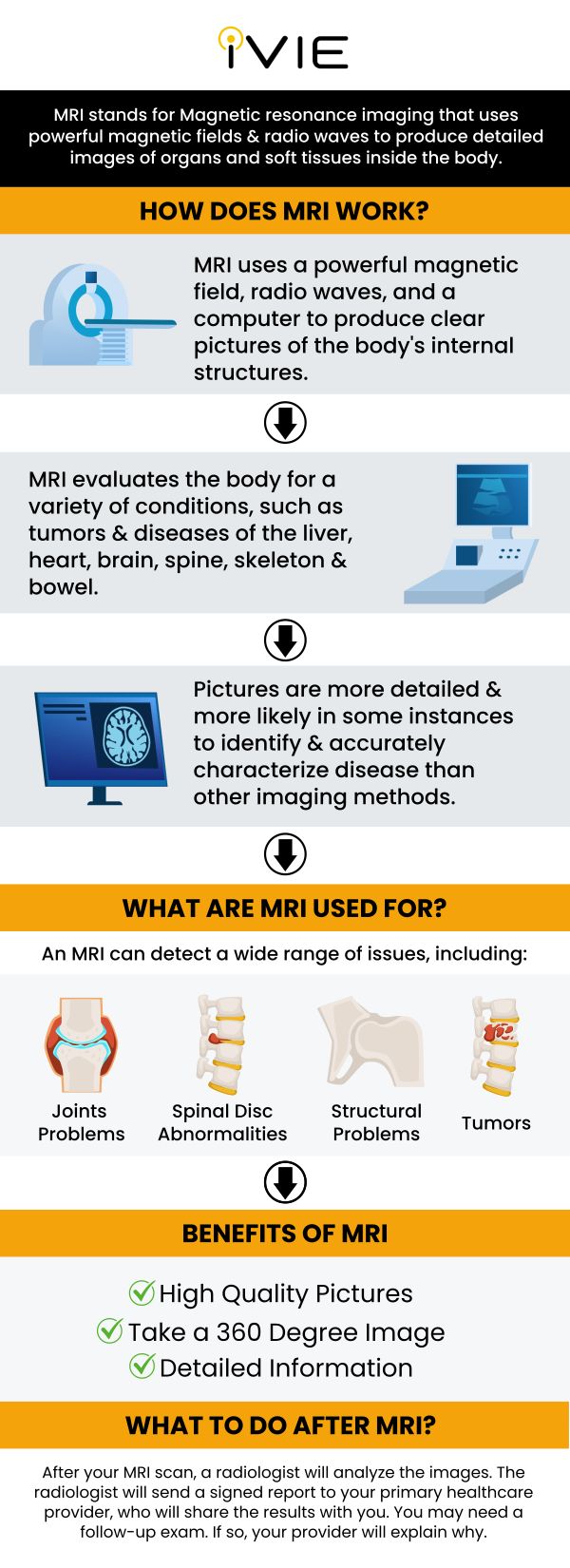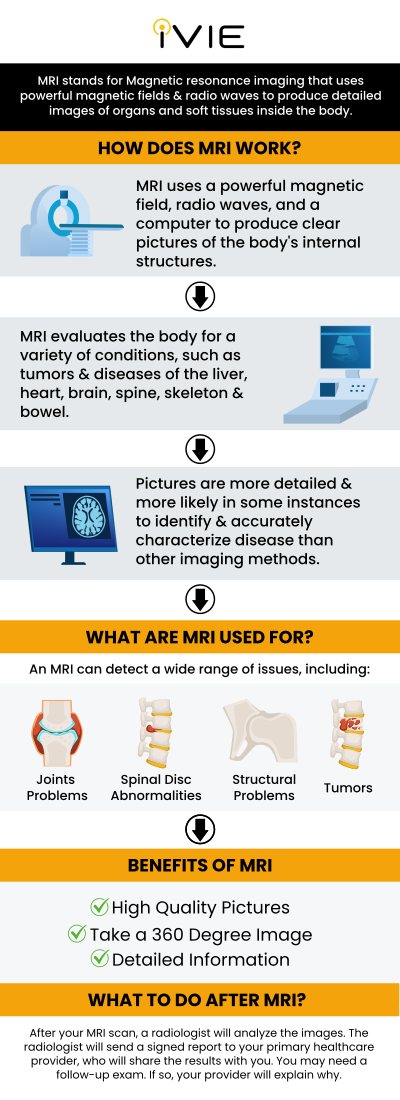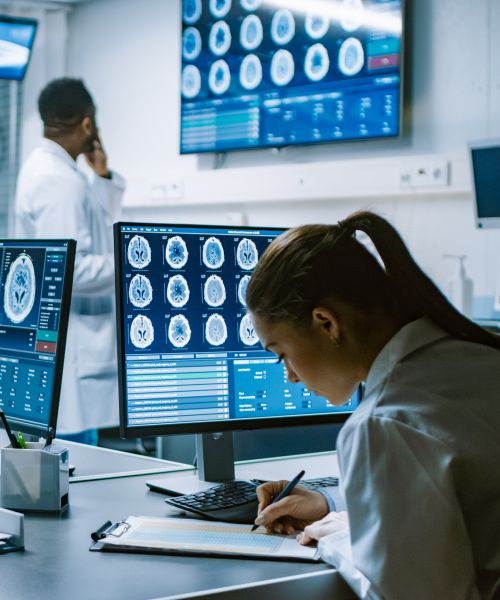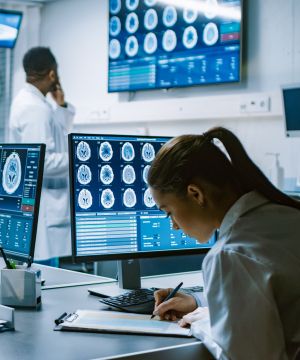Benefits of MRI Screening for Early Cancer Detection
MRI screening offers a powerful tool for early cancer detection, providing detailed images that can identify tumors at their earliest and most treatable stages. This non-invasive method enhances the chances of successful treatment by allowing for prompt intervention and personalized care. Meet Dr. Kourosh Naini and get your cancer screening at iVIE. For more information, contact us or book an appointment online. We are located at 11600 Washington Pl, Suit A, Culver City, CA 90066.


Table of Contents:
What is the purpose of an MRI?
Are there any dietary restrictions I should follow before the scan?
What can I do to stay calm if I’m claustrophobic?
Can I resume normal activities immediately after an MRI?
MRI’s non-invasive imaging technique allows us to visualize the internal structures of the body in great detail. This technology is instrumental in our medical practice and significantly enhances our diagnostic capabilities.
MRI is used to accurately diagnose and monitor a wide range of neurological conditions such as tumors, strokes, and neurodegenerative disorders like multiple sclerosis. This technology is invaluable in detecting these pathologies, facilitating early intervention, and improving patient outcomes.
Moreover, our practice also utilizes MRI to identify diseases in other organs such as the heart, liver, kidneys, and musculoskeletal structures. For instance, in sports medicine, MRI is used to evaluate joint abnormalities such as torn ligaments and cartilage, allowing us to provide appropriate treatments and help our patients return to their regular activities.
Beyond diagnosis, MRI technology also enables us to monitor disease progression over time, assess the effectiveness of treatment, and detect any changes in the severity of the condition.
It is important to prepare for your medical scan in the best possible way. This includes adhering to certain dietary restrictions to ensure that the results of your scan are as accurate and optimal as possible.
In some cases, a light meal a few hours before your scan may be permissible. However, it is advisable to avoid foods high in sugar, caffeine, and fat as these can obstruct the scanner from capturing a clear image.
For scans that involve the use of a dye or contrast material such as barium or iodine, further dietary adjustments may be required. For instance, if barium is used for imaging the digestive tract, a clear liquid diet may be necessary for up to 24 hours before your scan. If iodine is used for vascular imaging, you may need to abstain from certain foods, like seafood and dairy products, within a particular timeframe before the procedure.
Before your scan, it is essential to discuss these instructions with him or his healthcare team. They can provide you with the most accurate and specific advice based on the type of scan you’re undergoing and your personal health history. This ensures optimal scan results and a safe and effective procedure.
Claustrophobia, or the intense fear of enclosed spaces, can lead to substantial anxiety and discomfort. If you’re dealing with claustrophobia and undergoing medical scans or procedures, there are several strategies we can help you employ to manage your fears and maintain calmness.
Understanding and Exposure:
At our practice, we work with you to understand the nature of your fears. Our team will help identify what triggers your claustrophobia and expose you to these triggers in a safe and controlled environment. This includes gradual exposure to our scanning equipment, starting with brief periods and increasing the duration as your anxiety decreases.
Cognitive Techniques:
With the aid of our licensed professionals, we can guide you through Cognitive Behavioral Therapy (CBT) to manage your claustrophobia. This will help you recognize and challenge the irrational thoughts that fuel your fear, and focus on the present, acknowledging the safety of our practice and the moment.
Relaxation Techniques:
Our team will guide you through deep breathing exercises, meditation, and mindfulness practices to help regulate your nervous system and reduce anxiety. By focusing on inhaling deeply and exhaling slowly, you can distract yourself from claustrophobic feelings. Visualization techniques, like imagining yourself in a wide-open space, can also be beneficial.
Distraction Techniques:
We offer various distraction techniques during your procedures. This could include providing reading materials, playing soothing music, and engaging in conversation. We also have stress balls, weighted blankets, or fidget toys available to help ground you during the process.
Lifestyle Modifications:
Maintaining a healthy lifestyle is crucial, and our team can provide advice on regular exercise, a balanced diet, and sufficient sleep to better cope with anxiety. Avoiding caffeine and alcohol before your visit can also help manage anxiety levels and ensure a smoother procedure.
At the medical practice of Dr. Kourosh Naeini at iVIE scan, we often perform magnetic resonance imaging (MRI) scans as part of our comprehensive diagnostic process. Patients frequently ask if they can return to their normal routines immediately after an MRI. Fortunately, in most situations, you can resume your daily activities straight away following an MRI scan.
Effects of MRI Scans
MRI scans do not involve radiation, unlike other imaging techniques such as X-rays or CT scans. As a result, there are no immediate side effects to worry about. However, it’s important to be aware that some patients may experience side effects from the contrast dye used in certain MRI scans, including nausea, dizziness, or allergic reactions.
Immediate Precautions
Following an MRI scan, we advise our patients to:
• Rest and avoid strenuous activities: If you suffer any of these symptoms following your MRI, it is advised that you rest and refrain from strenuous activity until you feel better. Weightlifting and running might increase blood flow to the injection site, causing discomfort.
• Monitor the injection site: If a contrast agent was used during the MRI, check the injection site for any signs of redness, swelling, or pain.
• Remove objects: Ensure you remove any leftover ferrous objects (e.g., jewelry, keys) that may have been left in the scanning area.
You could feel a little sleepy after the MRI if you were given a sedative to help you relax. In this instance, it is not recommended to drive or operate heavy machinery for at least 24 hours after the MRI.
Resuming Normal Activities
Once immediate precautions are addressed, most patients can resume normal activities within a few hours. However, it’s essential to consult with a healthcare professional for specific recommendations based on your circumstances.
While an MRI scan performed at iVIE is safe for most patients, it’s always crucial to listen to your body and give it the necessary time to recover. If you feel unwell after the procedure, don’t hesitate to seek medical advice from our team. We’re committed to ensuring our patients’ safety and well-being. For more information, contact us or book an appointment online. We are located at 11600 Washington Pl, Suit A, Culver City, CA 90066. We serve patients from Los Angeles CA, Beverly Hills CA, Santa Monica CA, Irvine CA, and surrounding areas.


Additional Services You May Need
▸ Dementia Screening
▸ Aneurysm Screening
▸ Spine MRI
▸ Whole Body MRI Screening
▸ MRI Brain Screening
▸ Brain PET
▸ Work/Sport Spine Injury Diagnosis
▸ Work/Sport Brain Injury Diagnosis
▸ Whole Body PET For Cancer
▸ MRA Brain Screening


